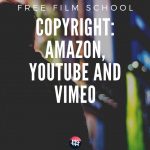Copyright: Amazon, YouTube and Vimeo
I recently noticed a conversation in a filmmaker forum about Amazon’s Prime Video Direct service. A filmmaker was asking what people thought about uploading a film. A commenter replied, pointing out the filmmaker would be giving the film’s rights away to Amazon.
Then a couple of others came back at that commenter saying he was wrong. He claimed you keep all your rights and he should know because “I’m a producer and I’ve put plenty of films on Amazon”.
Although I hadn’t recently checked the small print, I was under the impression that when we upload to Prime Video Direct, we keep the rights. However, I believed we also assign non-exclusive rights to Amazon too. So I went to check and a quick Google brought up the Video Direct terms.
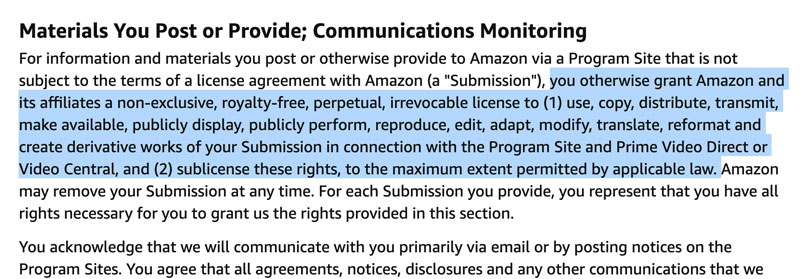
I’m not a lawyer, but I think that is pretty unambiguous. Let’s break it down to see what it means:
Information and Materials
As far as I can see, this means anything you upload to the service. And text, any video, any content in the video including music.
Non-Exclusive
Basically, this means you give Amazon a license but not an exclusive one. If it was exclusive, that would mean they are the only company/person allowed this license. Because it’s non-exclusive, it means you are free to continue using your content or licensing it to others.
Royalty free
This just means Amazon does not have to pay you anything for the license if it doesn’t want to.
Perpetual
Forever. Until the end of time. Or until Amazon goes bust. Whichever comes first.
Irrevocable
You cannot at any time cancel this agreement. By uploading content to Amazon, this license is permanent, no matter what.
What can they do with your stuff?
The next part lists what they are allowed to do with your content. Basically, whatever they want.
This includes “sub-licensing” which essentially means they can sell it to another party.
But what’s the problem? You still own your stuff, right?
Yes, you do still own it. But so does Amazon. By uploading your video to Amazon, you are now co-owners of the work.
That includes the screenplay, the music, the audio tracks, any frame and the image off all the actors in it, any poster you upload and so on.
I’m not saying you shouldn’t do it. But it’s good to know the legal situation you are putting yourself and your work in, isn’t it?
Is this a problem?
Possibly.
First, you need to understand the point of copyright. The reason we have copyright law is to protect you as an artist. If anyone can just take your work for free, then you have no incentive to create. Because anyone can just copy your work and claim it as theirs.
Let’s take an example:
George R.R. Martin is the author of the books upon which the series Game of Thrones was created. Now, supposing there was no copyright law, HBO could have taken his books and had some screenwriters adapt them without asking permission or paying Martin a penny. They wouldn’t even have to credit him.
Then again, Martin would have never written those books in the first place. Without copyright law to protect him, there would be no incentive. And a publisher would have no incentive to publish them, because any other publisher could just publish them too and cash in.
Therefore, without copyright laws, Game of Thrones probably wouldn’t exist. Either as a series of books or as a TV series. So we can see it’s actually in HBO’s (and Game of Thrones fans) interest to protect copyright laws.
Amazon
However, a different search brought up a slightly different set of terms of service. This version includes the line:
“We may terminate this Agreement by providing notice to you at any time. You may terminate this Agreement at any time by providing notice of termination to us…”
Which suggests there is an option to limit the license given to Amazon. There’s also a different set of rights granted:
“You hereby grant Amazon a non-exclusive license in the Territory to use, reproduce, reformat for online delivery, encode, encrypt, market, promote, transmit, distribute and display on the Service the audio-visual programs (“Titles”) pursuant to each Distribution Mode that you indicate on the Program Site.”
Which sounds more like simple permissions needed to distribute your work on the site.
So there appears to be 2 sets of terms of conditions. As far as I know, the second (more agreeable) version is the only one you are required to agree to when uploading video.
YouTube
This is YouTube’s small print:
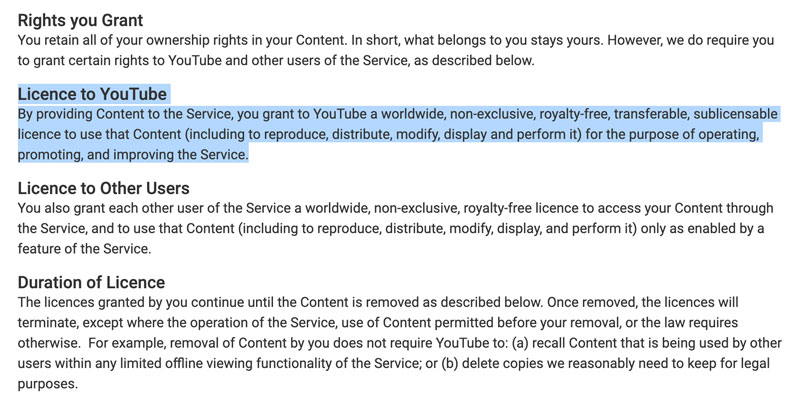
When you upload your video to YouTube, you license it to them the same way as you do to Amazon.
However, there are some notable differences. YouTube’s terms say they can use your work only for “for the purpose of operating, promoting, and improving the Service.” Which is very different to Amazon’s rights to do whatever they want with it.
Also, rather than lasting until the end of time, YouTube’s license only lasts until you remove your video.
All in all, as far as assigning rights, YouTube’s terms are a lot less exploitative than Amazon’s terms.
Vimeo
This is Vimeo’s small print regarding copyright assignment:
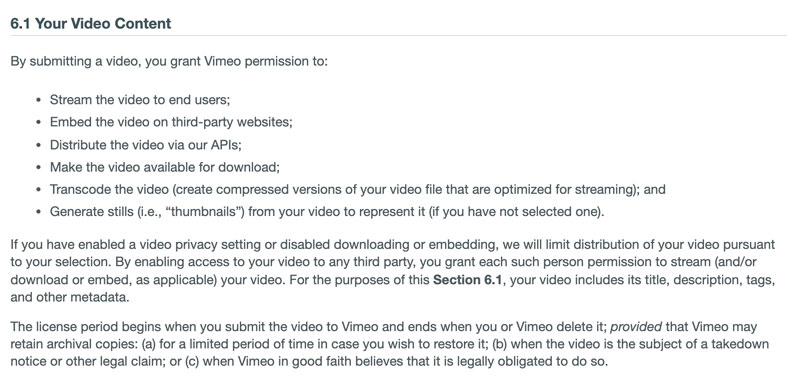
As we can see, Vimeo’s conditions are even more agreeable. There is no license for Vimeo over your work, you only give them permission to stream, embed, make the video available to download, transcode and generate stills from.
Most of that is simply what the site needs to function as a video streaming platform.
Like YouTube, all these permissions taken back once you remove the video.
This is an excerpt from Facebook’s terms:
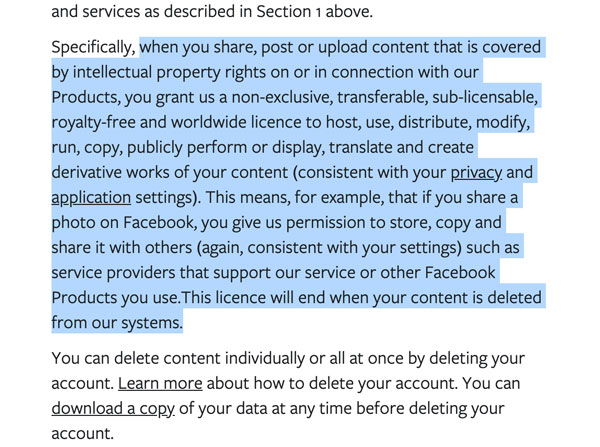
Facebook’s terms seem similar in scope to Amazon’s. The big difference is that this license ends at the point you delete your post or video.
Ah wait – it actually says “This licence will end when your content is deleted from our systems.” Is that a clever wording? Just because you remove a post doesn’t mean it’s deleted from their system, necessarily. In fact, they go on to say:
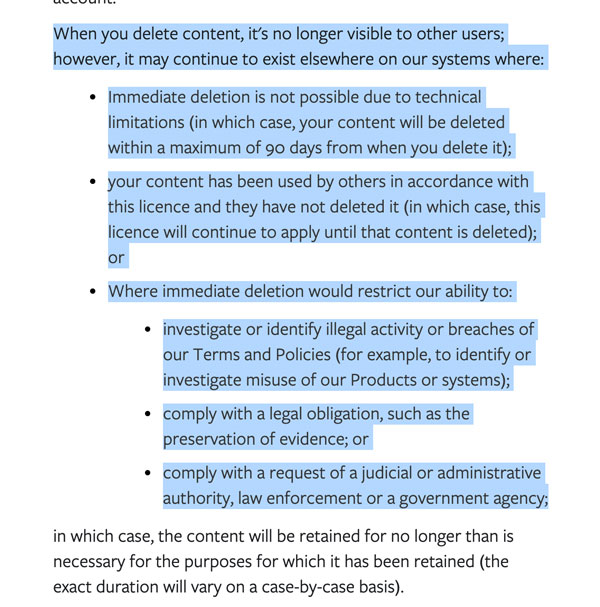
That’s a bit of a rabbit hole, isn’t it?
Here are instagram’s terms for uploaded content:
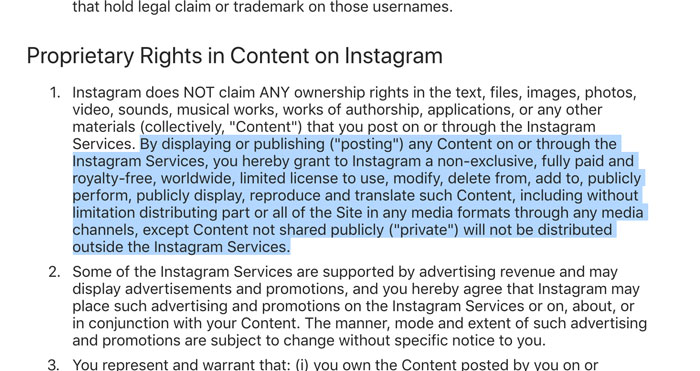
Instagram doesn’t mention a duration, so we can only assume the license we grant is until we remove the content. Again, not as all-encompassing as Amazon, but still quite a comprehensive licensing of your rights for free.
This is an excerpt from Twitter’s terms of service:
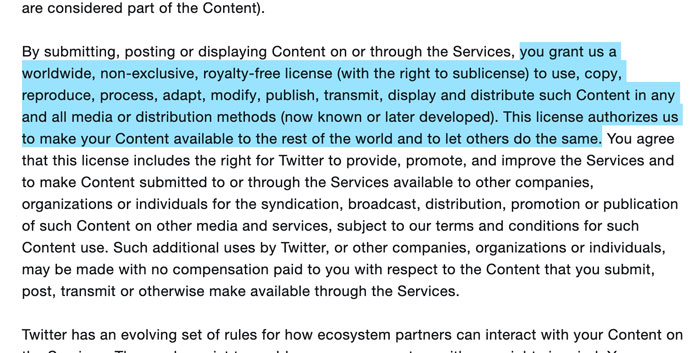
Again, anything you upload is licensed to Twitter. Like Instagram, there is no mention of a duration of this license. Twitter also has the right to sublicense your work, so they could legally sell it to someone else.
What does this mean for you?
So that is a basic overview of the terms of service of the major social media platforms and Amazon. Certainly, Amazon’s Prime Video Direct service is the worst deal for creators – if you go by the first terms listed above. And this is simply down to the fact that once you have agreed, this license lasts forever.
But what does that mean for Prime Video Direct users in reality? It could mean that, if your film or show becomes hugely successful (like George R.R. Martin’s Game of Thrones novels), then Amazon can monetize it without paying you anything in return.
Theoretically, they could delete your account and re-publish the material under their own account and collect 100% of the royalties. Theoretically, they could also get writers to re-write the stories from your movies and make their own show from it.
Theoretically.
Like I say, I’m not an entertainment lawyer. I’m just going on my understanding (based on 30 years as a working filmmaker and music composer). Would Amazon do this? No idea. Could they get away with this legally if challenged in court – again, I don’t know.
But certainly it’s something to consider before you upload your movie. On the other hand, the second listed terms of service are more in line with the other platforms listed here. More of an agreement to allow the platform to distribute your work.
And the other platforms?
From first study, they appear to be limited in their duration. This means you ultimately have control over your work. Perhaps also with Amazon, but their double terms and conditions make it more ambiguous.
Going back some years, I remember creators being outraged if they were offered poor terms by companies or individuals. As musicians, we would never have signed a deal of unlimited length with no guarantee of financial return. But these days, since the arrival of easy file sharing, we’ve all become more casual about sharing the rights of our work with big platforms.
So should we resist or should we simply accept this is the future? These services do allow us to share our work with great ease, but the value of the work might also be compromised by doing so.
Read Next: Music Licensing: Using Music In Your Videos
Eager to learn more?
Join our weekly newsletter featuring inspiring stories, no-budget filmmaking tips and comprehensive equipment reviews to help you turn your film projects into reality!
Simon Horrocks
Simon Horrocks is a screenwriter & filmmaker. His debut feature THIRD CONTACT was shot on a consumer camcorder and premiered at the BFI IMAX in 2013. His shot-on-smartphones sci-fi series SILENT EYE featured on Amazon Prime. He now runs a popular Patreon page which offers online courses for beginners, customised tips and more: www.patreon.com/SilentEye


